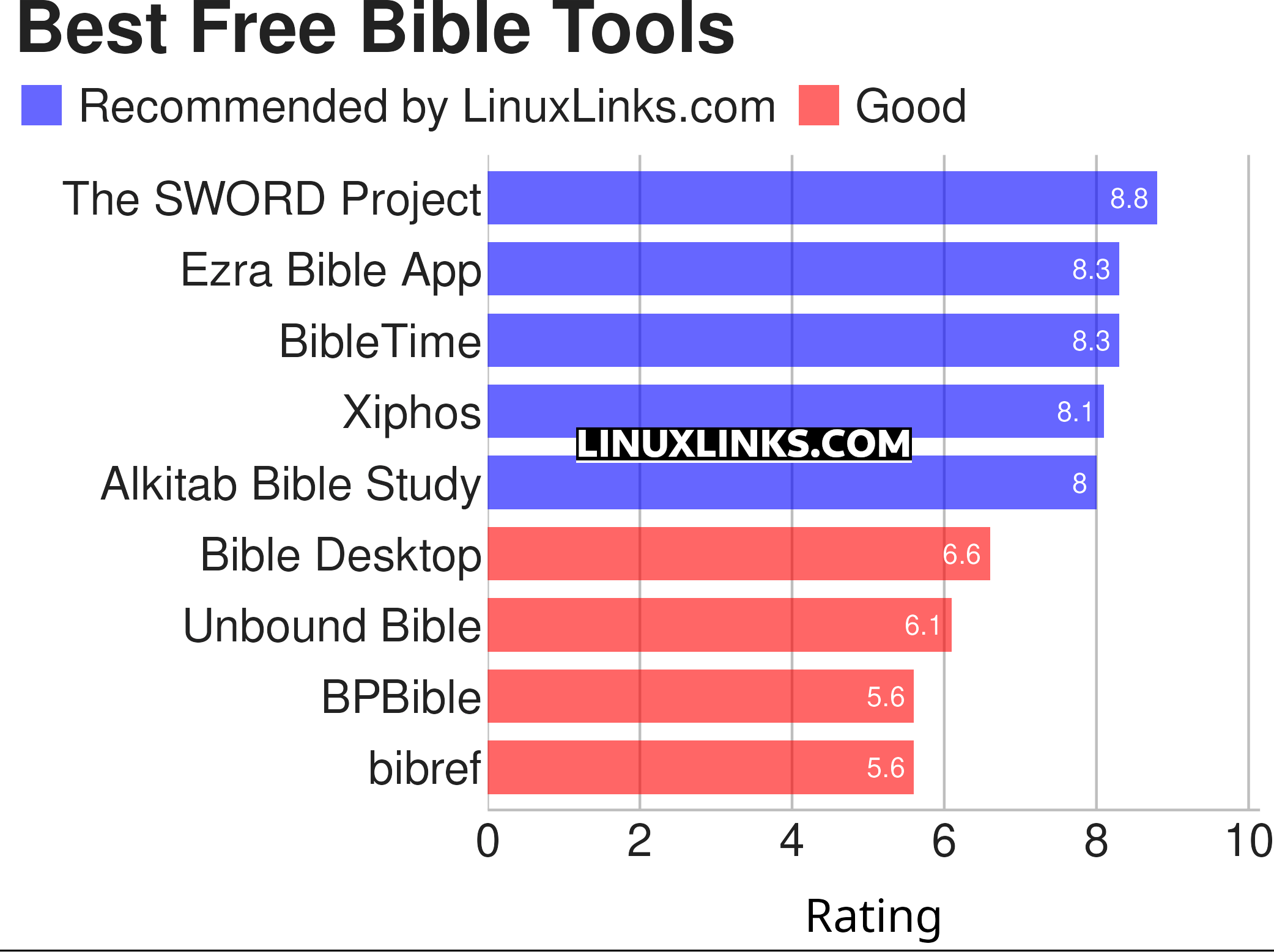Easter is the most important annual religious festival for Christians. It is the celebration of the resurrection of the central figure of Christianity, Jesus of Nazareth (Jesus Christ). It therefore seems an appropriate point in the year for us to turn our attention to open source Linux Bible software.
The Bible refers to one of two closely related religious texts central to Judaism and Christianity, the Hebrew or Christian sacred scriptures respectively.
Bible software helps to make religious studies more effective, more organised, and more rewarding. For example, this type of software makes it possible to navigate around the religious texts more quickly, to perform complex searches to find passages, to serve up daily devotionals (where insightful and revealing passages of the Bible and key Bible characters are presented to the user), and much more.
To provide an insight into the quality of software that is available, we have compiled a list of 9 high quality Linux Bible software. Hopefully, there will be something of interest for anyone who wants to learn more about God and his work.
Here’s our verdict captured in a legendary LinuxLinks-style ratings chart. Only free and open source software is eligible for inclusion here.

Click the links in the table below to learn more about each tool.
| Bible Software | |
|---|---|
| The SWORD Project | CrossWire Bible Society's free Bible software |
| Ezra Bible App | Modern and user-friendly Bible software |
| BibleTime | Qt based Bible study program |
| Xiphos | Offers a rich environment for reading, study, and research |
| Alkitab Bible Study | Offers rich and user friendly Bible study tools |
| Bible Desktop | Easy to use study tool |
| Unbound Bible | Multilingual Bible-reader software |
| BPBible | Flexible study tool |
| bibref | Discover internal references in the Bible |
This article has been revamped in line with our recent announcement.
 Read our complete collection of recommended free and open source software. Our curated compilation covers all categories of software. Read our complete collection of recommended free and open source software. Our curated compilation covers all categories of software. Spotted a useful open source Linux program not covered on our site? Please let us know by completing this form. The software collection forms part of our series of informative articles for Linux enthusiasts. There are hundreds of in-depth reviews, open source alternatives to proprietary software from large corporations like Google, Microsoft, Apple, Adobe, IBM, Cisco, Oracle, and Autodesk. There are also fun things to try, hardware, free programming books and tutorials, and much more. |

Historic comments have been retained for completeness.
1. Download this KJV text: http://www.gutenberg.org/files/30/
2. Use VIM to search for your text.
3. The above KJV version text is indexed to make addressing verses easy. To get to John 3:16, search for this:
“43:003:016”. 43rd book:chapter 003:verse 016
Tried most of them. They are all overly complicated. I simply downloaded a copy of my favourite version in text format and use FocusWriter to access it. I also have some commentaries and dictionaries in text format that show up as tabs on the bottom of FocusWriter for quick access. And a tab for notes. Simple and efficient.
Friar Tux,
Thank you so much – I tried this and it is exactly what I needed. Simple and efficient as you said. Have a great and safe year.
Where did you find the ‘text’ format for your “favorite” version?
In Xiphos, when you go to module manager, you can install an enormous range of Bible versions from many different languages (but I’m not sure about the Bibles which are copyright and must be paid for)
When you right click on a verse to Copy/Export, you can choose between verse, chapter or book – so you can download a whole book to clipboard with a click.
You could repeat that for each book of the Bible.
Xiphos is great. I’ve been using it for years.
I did have problems with the flatpack version, but the repo versions have worked great for me.
Great search facility.
Enormous range of foreign versions.
Tabs so you can have several tabs open at once (and be back there next time you open it up)
KJV so no need to use corrupted versions
TSK commentary is worth my weight in gold as a study resource (provides links to other verses)
I also use e-Sword via WINE. It has some advantages (eg easier to use commentaries) and some disadvantages. It runs on WINE but not flawlessly.
The big problem I have with Xiphos is that the personal commentary cannot be edited because the study pad is broken and has been broken for years — years.
It seems to me that Bible study should ‘require’ your doing the research and taking notes with references. It should be a high priority in the development. So it amazes me that this would go on so long. Last working version was 3.2.2 which was in Debian jessie.
It grieves me to no end . . .
The Berean Study BIble, reminiscent of the NIV84 for me, offers a variety of free files in various formats.
Using a eBook reader can be helpful here.
Nothing I have used on Linux compares to E-Sword, so I use Gnome Boxes and run windows 10 in it so I can access E-sword.
Did you try running it with Wine?
I use BibleTime. I tried Xiphos on my LinuxMint but I couldn’t get it to configure as it claims. I like to show parallel versions but it would only show them in tabs. Overall, I find BibleTime easier (though not trivial) to configure.
I have not found the NIV translation for any of the apps. (My favourite translation is NIV84.) I would appreciate if anyone knows of NIV text that works with BibleTime
As someone said, none of these compares with e-Sword on Windows.
Hi. That would be your software and hardware combination.
Having worked on Linux for years I have found that the best Linux
versions are Debian 12 and Ubuntu 24. Most of the spin-offs
have one problem or another…. I’ve been a Methodist preacher
for 40+ years and have used the Sword software since the 1990’s…
I have no problems with Xiphos configs… Hope this helps….
I am Catholic and I also use BibleTime 3.0.3, but it too has its drawbacks. First and foremost is the lack of access to the Early Church Fathers.
theWord, like e-sword but better. Runs great in wine and thus far the best resource for bible study on Linux.
1) This is a Linux site.
2) theWord doesn’t run natively under Linux
3) theWord isn’t even open source.
Hence your comment is irrelevant here.
Eve, you might have missed that he runs it under Wine
Given that Eve said that particular software doesn’t run natively under Linux, I don’t think they missed that it runs under Wine.
Our roundups of the best free and open source software focus on software that runs natively on Linux.
I have downloaded an html version on the bible, then just put a link in your web browser to the index page. This works really well, it is quick and easy to use.
That’s a web-based solution 😉
By chance could you post a link for that html version?
Xiphos and Bibletime will not run on all Linux distros. Debian based distros (Debian, Ubuntu, Mint) do work; as well as Fedora, openSUSE and Arch based distros such as Manjaro. Most, if not all other distros are not compatible with these two Bible programs.
That isn’t true. For starters there’s a Flatpak available for both Xiphos and Bibletime so this software runs on other modern (x86_64) Linux distro, not just distros that are based on the ones you mention.
Building the software from source is also available which works on other independent distributions. I know, I have them running.
In any event, your statement is pretty pointless given that there are nigh on 1000 distros. I’m sure a specific bit of software won’t run on every single distro.
Not only x86_64. Flatpaks work great on ARM devices like the Raspberry Pi 5.